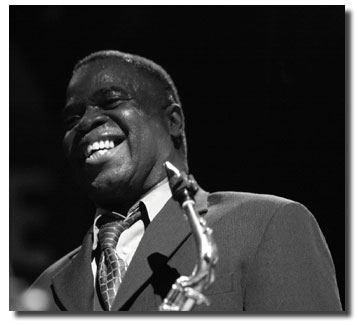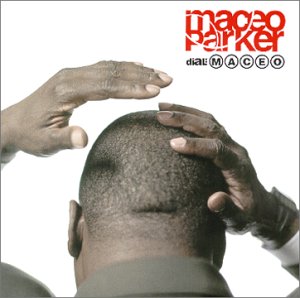
A
FIRESIDE CHAT WITH MACEO PARKER
I
have this recording of James Brown playing a gig at the Apollo in Harlem.
I cannot define to you what is or isn't a classic. I leave that shit to
Rolling Stone, Spin, Down Beat, Ebert, or these other critics, scholars,
and socialites. What I know is what I like and I liked James Brown. Now,
I am not of his "era" (whatever the fuck that means). After all, Brown
is a little bit before my time. But listening to him get funky rang true
with me and I am quite possibly the most unfunky guy on this planet Earth.
It wasn't until I fell out of my youth that I came to the realization
that James Brown (as funky as he was) would not have been James Brown
without his band and his band was the baddest in the land. Maceo Parker
was a member of James Brown's band for a number of years and he left quite
an impression. Parker has since parted ways with Brown and the saxophonist
is in the midst of a notable solo career. I sat down with Maceo to talk
about his days with James Brown and how he feels about hearing, "Maceo,
blow your horn." And as always, I bring it to you, unedited and in his
own words.
FRED JUNG: Let's start from the beginning.
MACEO PARKER: Well, my uncle had a band and often we would get me, my
brothers, and everybody who felt like we want to imitate our uncle and
everybody his age in his group. We just sort of hung around them all the
time when they rehearsed and I think that is where we got the most motivation,
just trying to be like them and the fact that they had a band and they
played and performed at different nightclubs and we wanted to do the same
things.
FJ: Influences?
MACEO PARKER: I really was into Ray Charles, Ray Charles and Ray Charles'
band. I really, really liked him. That made me like David Newman, "Fathead"
Newman, the saxophone player, Hank Crawford. In terms of trumpet players,
there was a guy named Marcus Belgrave and Philip Guilbeau, I believe.
But again, that was the Ray Charles band, but outside of Ray Charles'
band was Cannonball Adderley. I liked Stanley Turrentine, King Curtis,
these are the people that I grew up with.
FJ: What was it about Cannonball's sound that you identified with as an
alto player?
MACEO PARKER: I just liked the style. I liked his style, his command.
That is what felt when I listened to Cannonball. Plus, he played jazz
and he played funk. That is another thing that I really, really enjoyed
about Cannonball. I could hear his jazz licks, rather than some other
people, where I couldn't really hear. I definitely could hear the funky
side. He was extraordinary, in that he was well on both sides of the fence.
FJ: Do you find a correlation between funk and jazz?
MACEO PARKER: Well, yeah. Yeah, but it depends on the individual, who
is playing and how close you want to get to it. It is all up to the individual.
FJ: How close to the fire do you like to be?
MACEO PARKER: I tend, when I play, I tend to keep it sort of close because
I like some of the jazz licks against the funky background and I like
the funky licks against the funky background like with James Brown. You
have to have the ability to do that. I have the God-given talent to be
able to do that and a lot of people can't do it. That is where the talent
shows, I suppose. I like it. I just do. I just like it like that.
FJ: Let's touch on your Funk Overload release on What Are? Records.
MACEO PARKER: Again, what I do is just a continuation of what we were
doing at the time, taking it from the stage to the studio, and then out
to the people who feel like they want to have whatever it is that we're
doing. That is what Funk Overload is. It's what we were doing at that
time. It also introduced Corey, my son, as a rap artist because that was
the one that he made his debut on. That would always be his first one
and we're still doing the tune that he rapped on. Funk Overload will always
be outstanding to me, I suppose, Fred, for that reason.
FJ: And Dial M-A-C-E-O?
MACEO PARKER: It is a continuation as well, just different songs, different
approach maybe, although it is not that much different because it is what
we're doing now. That is sort of how I do what I do. It just happens to
be whatever frame of mind that I am in when it is time to record, or what
page I'm on, or what lane I'm in. It's always going to be somewhat funky.
This is because of the link that I have had with different friends. That
is what makes Dial M-A-C-E-O special to us. "Maceo, blow your horn" is
from all different kinds of artists. That was really the concept, but
it didn't really turn out to be what it is.
FJ: When you hear, "Maceo, blow your horn," do you get flashbacks?
MACEO PARKER: (Laughing) No, no, it is pretty much old hat now, Fred.
It never did give me chills. It was just a signal that it was time to
do the sax solo now and I only thought of it as that. It wasn't too much
more than that. I have always been thrilled of it and considered it somewhat
lucky that James Brown used that phrase, but it wasn't more than that,
just that now, I am finished singing for a minute and now, you play.
FJ: Does it concern you that regardless of your undertakings as a solo
artist, you will always be known for your work with James Brown?
MACEO PARKER: No, no, if you are talking about James Brown, then it is
secondary, unless we're doing a lot of instrumentals, where I am doing
a lot of lead stuff and the things that have to come out are instrumental
rather than vocal. And it is secondary. That was my role and that was
the part that I played and I was comfortable with that. So no, it doesn't
bother me at all. Everybody can't be the pitcher. Everybody can't be the
designated hitter. I knew my position and that was it. During my young
years, again, that was just my role. I chose to do that. I chose to be
a part of the group, the sideman and all of that. Simply because that
is all I wanted to be at that time and so that was OK with me.
FJ: May you continue to hear, "Maceo, blow your horn" for many years to
come.
MACEO PARKER: (Laughing) Thank you very much, Fred.
Fred Jung is the Editor-In-Chief and outsources life. Email
Him.

